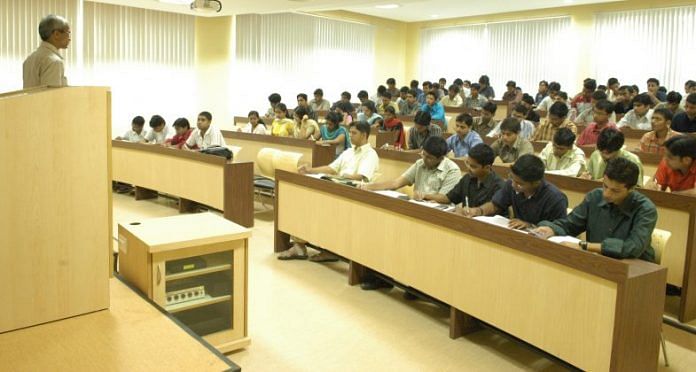Thank you dear subscribers, we are overwhelmed with your response.
Your Turn is a unique section from ThePrint featuring points of view from its subscribers. If you are a subscriber, have a point of view, please send it to us. If not, do subscribe here: https://theprint.in/subscribe/
A teacher asked a question regarding carrier choices to his students, and most answers were like “Engineer, Doctor, CA, Administrative officer, etc.” Sadly no one said “Teacher.” Everyone remembers this scene from their school days, and hopefully, everyone is working on their dream job/work. The teacher never asked his students why they didn’t consider a teacher as a carrier option. But the question remains hidden, unanswered with flawed arguments.
Teachers have an essential role in education, particularly in the students’ lives they instruct in the classroom. A teacher is defined by his or her capacity to instruct students and has a good impact on them. A teacher’s fundamental responsibility is to transfer knowledge. The instructor also plays a role of an external parent. Teachers can act as mentors to guide children in the proper direction. In this capacity, the teacher may inspire and advise pupils while also encouraging them to be the best. Being a teacher entails more than just teaching according to the curriculum; but it involves cultivating the child. Teachers not only convey knowledge but also assist in character development. The position carries a lot of weight and responsibility. We have seen Acharya, Gurus, Teachers, Professors, etc., in this country; this position remains underrated now. The impact is quite evident and visible in Indian Education System, where good instructors are pretty low.
The most common assumption in our culture is that “those who can’t accomplish anything, they become teachers,” which is entirely false. This way, our society mistreats the position itself. Nobody wants to work as a teacher. This isn’t a generalization but a harsh reality of our culture. Parents do not want their children to become teachers. The occupation is so underappreciated that it doesn’t fascinate others to become a teacher. In India, the significance of a profession is evaluated by its monetary rewards. The pay scale of the teacher is relatively low compared to other professions. Once, one IIT Bombay professor told me that he cannot buy a flat in Mumbai after 30 years of service. This reflects that it isn’t easy to be a school teacher unless and until motivation surpasses other motives.
Apart from not entering a favourite field, some instructors make a deliberate choice due to the inherent “nobility” of the job or encouragement from parents or a teacher. There is a significant difference between men and women. Women seem to have chosen the occupation for a variety of reasons, including respectability, stability, and less work since they can also handle their home. Women instructors also choose based on their parent’s or husband’s favored options. Especially married women choose this profession nearby their homes due to prevalent stereotypes. It is widespread in India that teachers are required to perform various non-teaching jobs that take them away from the classroom.
The situation becomes worse in remote areas that lack facilities. Most of the Govt schools are situated in rural areas. These schools have one or two instructors with no boundary wall, no working bathrooms, and sometimes no functional blackboards. Corruption concerns (paying for transfers or preventing transfers, deputations, appointments, promotions, and special assignments) have tainted the country’s wider educational environment. It is more important to build networks with politicians. There is almost no reward for instructors who go above and beyond the call of duty to enable their students to study and advance in life. Instructors who associate with politicians and city leaders, on the other hand, gain high-paying jobs and rewards.
All these things cause a lack of accountability and poor motivation among teachers. The need of the hour is to restore the power and importance of this position. There should be an improvement in the qualitative life of teachers through various means like incentives, awareness programs, and initiatives to recognize their efforts, etc. Policymakers and educational leaders will need to collaborate to ensure that teachers have the work conditions and resources required to carry out their critical job as educators. This might be a once-in-a-lifetime opportunity to use this pandemic time for teachers to give them more significant space at the table when addressing education, working conditions, and their position. Governments need to safeguard teachers’ safety, health, well-being, and employment and improve teachers’ working conditions. It is time to recognize the role of teachers and the value of education.
—Rajpal Bijarnia
These pieces are being published as they have been received – they have not been edited/fact-checked by ThePrint.

